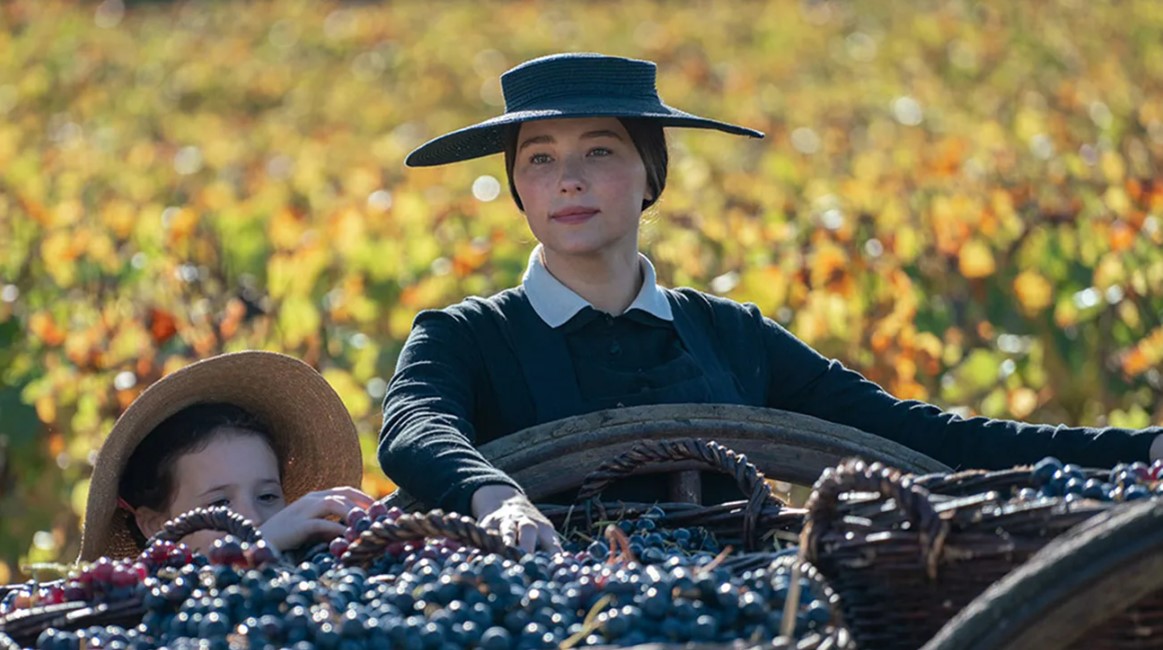Widow Clicquot
Widow Clicquot, 2024, 3 stars
A unique period piece
Haley Bennett powers French historical drama

Haley Bennett stars in Widow Clicquot. (The image is copyright Fourth and Twenty Eight Films / WME Independent / Vertical Entertainment.)
Exclusive to MeierMovies, July 17, 2024
A young woman‘s beloved husband dies under tragic circumstances. Against all odds, including her society’s rules that make it almost impossible for women to succeed in commerce, she grows her family’s business and defies the patriarchy.
No, it’s not an anecdote from J.D. Vance’s future America. It’s the plot of Widow Clicquot, the new film by director Thomas Napper, set in 19th-century France. The Clicquot in question is Barbe-Nicole Ponsardin Clicquot, who, upon the death of her spouse, Francois, in 1805, took over the business instead of selling it or allowing men to run it, as was expected.
“My husband is not dead,” she proclaims in the movie. “He lives in the vines.”
Pioneering new methods of production and a new rosé blend, she eventually succeeded, becoming known as the “Grande Dame of Champagne.” (The company, now known as Veuve Clicquot, apparently consulted on the film.)
The screenplay, by Erin Dignam and Christopher Monger, is based loosely on the book by Tilar J. Mazzeo. That book is more expansive than the film, focusing on the entire life of Clicquot. The film, as films are wont to do, pares down the plot to the time immediately preceding and following the death of Francois.
Though somewhat necessary, the edits are regrettable, as many of the most interesting aspects of Clicquot’s life are left on the page. What is more regrettable are the poetic licenses and simplifications, such as brushing aside the official cause of Francois’s death and the introduction of a close friendship (with bisexual overtones) between Francois and his wine merchant, Louis. (I confirmed with the film’s publicist that this relationship, which they describe as simply a “friendship,” is fictional and not present in the book.)
Films have, of course, been taking such licenses since the dawn of the artform. (Spoiler alert: The felines in Thomas Edison and William Dickson’s Boxing Cats of 1894 weren’t really professional pugilists.) But with a runtime of only 89 minutes, it’s a shame the filmmakers couldn’t spend more time on the real details of Barbe-Nicole’s amazing life.
Though we do learn something about the economic and social policies of Napolean Bonaparte, in addition to tidbits about the riddling process of champagne, this is first and foremost a message picture. Part inspiring, part heavy-handed, it will resonate with many and annoy others who view it as a “check the box” movie.
“The truth is, as I listened to you, I was glad to be a woman, even if I lose the rights of men,” Barbe-Nicole says in a rousing defense of the rights of women that is simultaneously uplifting, well delivered, justified, hard to swallow and misandrous. “Men are so certain, but does that mean they know the truth, or does it just mean they are certain of themselves?”
Despite sumptuous art direction, costumes and cinematography, Widow Clicquot would be rather pedestrian – for the aforementioned reasons and its slightly rushed, haphazard structure – if not for Haley Bennett, who, in the title role, successfully balances vulnerability and power, while projecting her trademark radiance. She is still one of the most underrated and under-the-radar actresses working today, despite her success in more than two dozen films, including Cyrano, Swallow and Hillbilly Elegy. (Take that, Vance!) She is also the partner of master director Joe Wright, who produced this film and directed her in Cyrano. (Napper, who is helming just his third feature, served as second-unit director on many Wright projects, including Atonement, Darkest Hour and Anna Karenina.)
Lending fine support are Sam Riley as Louis, Tom Sturridge as Francois and Ben Miles as Francois’ father. The scenes between Miles and Bennett are appropriately tense while those between Sturridge and Bennett are suitably romantic, even pulpy, awash in smooches and whispered poetry that might have seemed too saccharine if not for the undercurrent of mental illness that possibly played a role in Francois’ death.
Most viewers will remember the film’s feminism, but a metaphor concerning the vineyard – and Barbe-Nicole herself – is more powerful. When asked why she wants to limit the water supply to the vines, she says, “When they struggle to survive, they become more deeply reliant on their own strength. They become more of what they are meant to be.”
© 2024 MeierMovies, LLC
The film debuted at the 2023 Toronto International Film Festival, has played various festivals in 2024 and will see a limited theatrical release in the United States on July 19, 2024. For more information about the film, visit IMDB and Wikipedia.